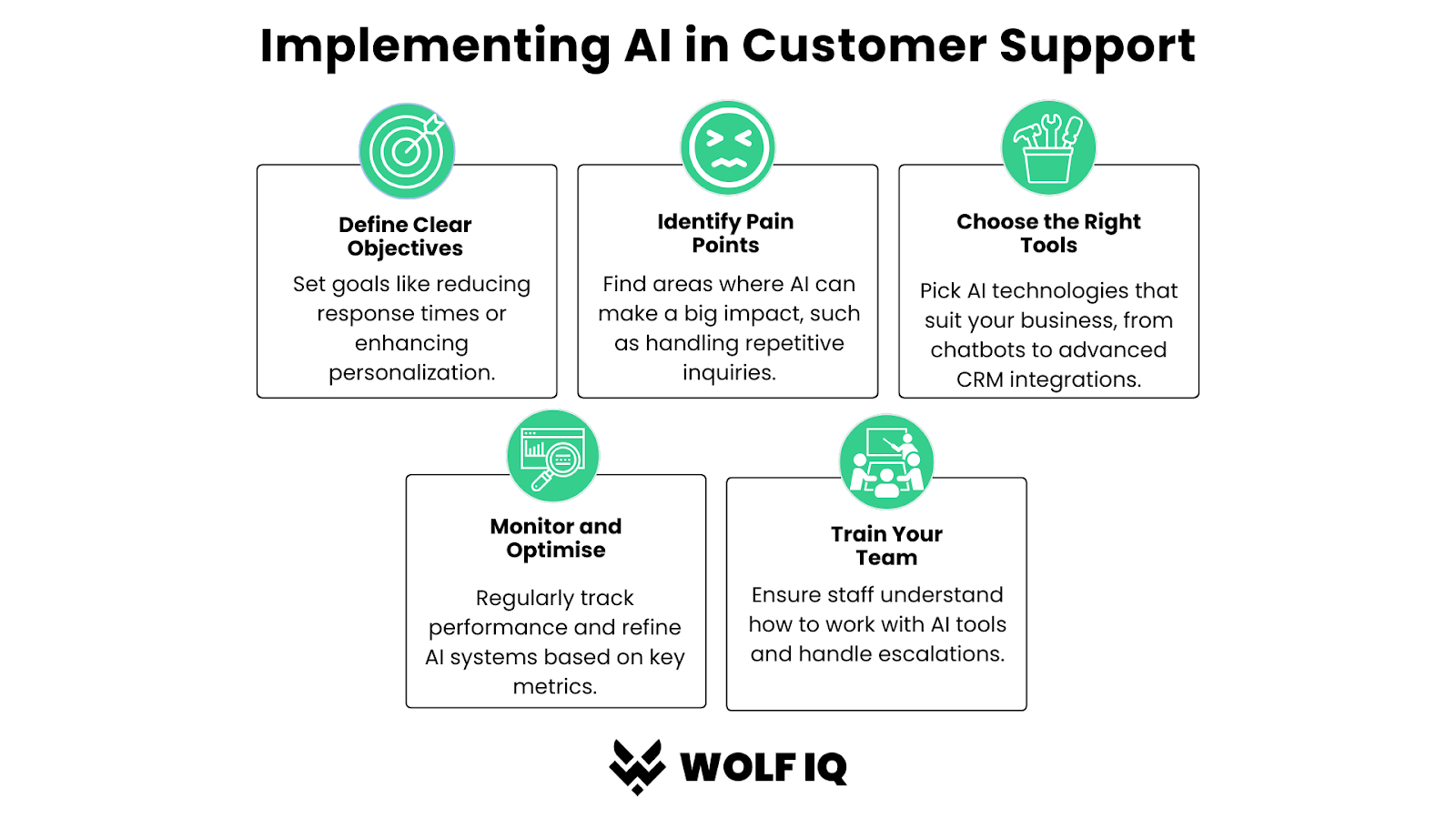How AI is Shaping the Future of Customer Support
In an era where efficiency and scalability are crucial for businesses, Artificial Intelligence (AI) is revolutionising customer support.
By leveraging advanced machine learning models and natural language processing (NLP), AI delivers solutions that are not only efficient but also highly personalised.
This transformation is redefining how businesses in Australia and beyond deliver exceptional customer service.
The Evolution of AI in Customer Support
From Manual Processes to Machine Learning
The journey of AI in customer support began with basic automated responses and has evolved into intelligent systems capable of learning and improving from each interaction.
The shift from reactive to proactive and, ultimately, predictive customer service reflects AI's immense potential to transform industries.
Key Milestones in AI-Driven Customer Support
- Early Adoption: Initially, AI was deployed to manage simple FAQs and streamline call centre workflows.
- Chatbot Revolution: The introduction of chatbots marked a significant milestone, enabling businesses to offer round-the-clock assistance.
- Voice Recognition: With AI-powered voice recognition, virtual assistants like Siri and Alexa entered the scene, setting new standards for conversational AI.
- Predictive Analytics: AI now uses predictive algorithms to analyse customer behaviour and anticipate their needs before they arise, taking customer service to new heights.

Core Benefits of AI in Customer Support
AI-powered technologies offer businesses a competitive edge by improving efficiency, personalisation, and availability in customer service operations. Here are the key benefits:
Enhanced Efficiency
AI automates repetitive tasks, such as ticket sorting or initial customer queries, allowing human agents to focus on more complex and strategic interactions.
This not only boosts productivity but also helps businesses scale customer service without increasing costs.
Reduced Response Times
AI provides instantaneous responses, significantly reducing wait times and ensuring faster resolutions.
For example, chatbots can handle multiple queries simultaneously, eliminating the need for customers to queue for assistance.
Personalised Customer Experiences
By analysing past interactions and customer data, AI can offer tailored recommendations and solutions.
For example, AI might suggest specific products or services based on previous purchase behaviour, enhancing customer satisfaction.
24/7 Availability
AI tools like chatbots and virtual assistants ensure customer support is available around the clock, providing seamless assistance outside regular business hours. This is especially beneficial for Australian businesses looking to cater to global audiences or offer consistent local support.

Implementing AI in Customer Support
To fully reap the benefits of AI, businesses must approach implementation strategically. Here’s how to do it:

#1. Define Clear Objectives
Outline the specific goals you aim to achieve, such as reducing response times, enhancing personalisation, or improving operational efficiency.
#2. Identify Pain Points
Assess your existing customer support processes to identify areas where AI can make the most significant impact.
This could include handling repetitive inquiries or improving after-hours support.
#3. Choose the Right Tools
Select AI technologies that align with your business needs.
For example, small businesses might benefit from affordable AI-powered chatbots, while larger enterprises may require advanced CRM integrations with AI capabilities.
#4. Train Your Team
Ensure your team is equipped with the necessary skills to work alongside AI tools. Staff should understand how AI fits into workflows and how to handle escalations seamlessly.
#5. Monitor and Optimise
AI tools require continuous monitoring to ensure optimal performance. Regularly analyse metrics such as response times, resolution rates, and customer satisfaction to refine your AI systems.
Challenges and Considerations
While AI in customer support offers immense benefits, businesses must navigate certain challenges to ensure successful implementation:
Integration Complexities
Integrating AI tools with existing systems, such as CRMs or help desk platforms, can be technically challenging. Businesses must invest in the right resources to ensure smooth integration.
Data Security
AI systems process large amounts of sensitive customer data. Australian businesses must comply with Australia’s Privacy Act 1988 and ensure robust data protection measures are in place to safeguard customer information.
Managing Customer Expectations
As businesses transition to AI-supported interactions, they must manage customer perceptions carefully. A poor AI experience, such as chatbots providing irrelevant responses, can lead to frustration.
Future Trends in AI for Customer Support
As AI continues to evolve, its application in customer support will become even more dynamic. Here are some key trends to watch for:
Predictive and Preventative Customer Service
AI will move from reactive to predictive customer support, identifying potential issues before customers even contact support teams. For example, AI could detect system outages and proactively notify users with solutions.
Hyper-Personalisation
Future AI systems will leverage deeper learning algorithms to deliver even more precise personalisation. This could include recommending tailored products or services in real time.
Integration with IoT
The integration of AI with Internet of Things (IoT) devices will create seamless customer experiences. For instance, AI could automatically identify issues with a smart appliance and contact customer support on behalf of the user.
Conclusion
AI is reshaping customer support in ways that were unimaginable just a few years ago.
From reducing response times to delivering personalised interactions, AI offers Australian businesses an unparalleled opportunity to enhance customer satisfaction and stay ahead in a competitive market.
By integrating AI tools strategically, businesses can unlock new levels of efficiency and innovation in customer service, ensuring they remain at the forefront of industry advancements.


.png)
.png)
.png)
.png)
.png)
.png)
.png)
